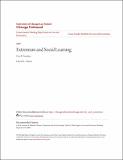| dc.contributor.author | Sunstein, Cass Robert | |
| dc.date.accessioned | 2014-09-08T16:07:52Z | |
| dc.date.issued | 2007 | |
| dc.identifier.citation | Cass R. Sunstein & Edward L Glaeser, Extremism and Social Learning (John M. Olin Program in L. & Econ., Working Paper No. 375, 2007). | en_US |
| dc.identifier.uri | http://nrs.harvard.edu/urn-3:HUL.InstRepos:12785990 | |
| dc.description.abstract | When members of deliberating groups speak with one another, their predeliberation tendencies often become exacerbated as their views become more extreme. The resulting phenomenon—group polarization—has been observed in many settings, and it bears on the actions of juries, administrative tribunals, corporate boards, and other institutions. Polarization can result from rational Bayesian updating by group members, but in many contexts, this rational interpretation of polarization seems implausible. We argue that people are better seen as Credulous Bayesians, who insufficiently adjust for idiosyncratic features of particular environments and put excessive weight on the statements of others where there are 1) common sources of information; 2) highly unrepresentative group membership; 3) statements that are made to obtain approval; and 4) statements that are designed to manipulate. Credulous Bayesianism can produce extremism and significant blunders. We discuss the implications of Credulous Bayesianism for law and politics, including media policy and cognitive diversity on administrative agencies and courts. | en_US |
| dc.language.iso | en_US | en_US |
| dc.relation.isversionof | http://chicagounbound.uchicago.edu/law_and_economics/205/ | en_US |
| dash.license | LAA | |
| dc.title | Extremism and Social Learning | en_US |
| dc.type | Research Paper or Report | en_US |
| dc.description.version | Version of Record | en_US |
| dash.depositing.author | Sunstein, Cass Robert | |
| dc.date.available | 2014-09-08T16:07:52Z | |
| dash.contributor.affiliated | Sunstein, Cass | |


